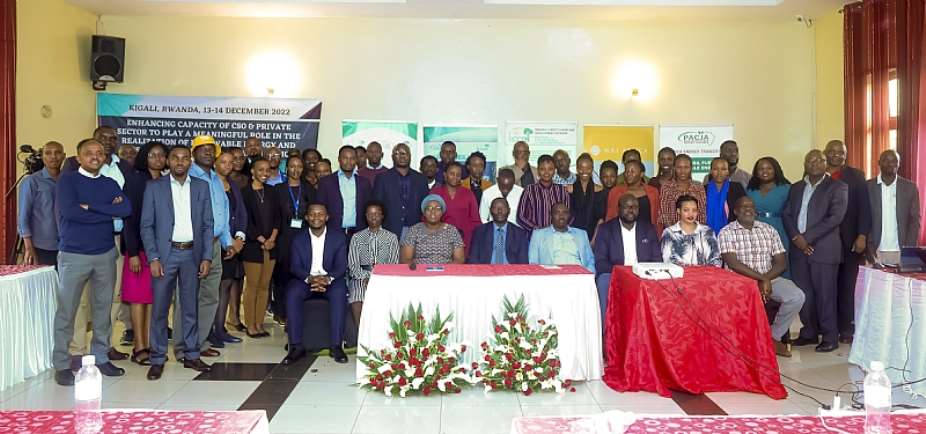Seven in ten people living in rural areas in Sub-Saharan Africa have no access to electricity leading to slowdown in achieving development goals, a multi-stakeholder meeting taking place in Kigali, Rwanda on Tuesday disclosed.
According to participants drawn from across Africa and attending the Renewable Energy and its Accessibility, without electricity, delivery of the region’s development ambitions as captured in Africa Union’s (AU) agenda 2063, including realisation of the goals of the African Continental Free Trade Area (AfCFTA) will not be possible.
“As much as it is unimaginable, yet it is true that in this twenty-first century, electricity remains a luxury to majority of Africans. At the same time, our policy makers do not find it strange and wanting to reverse the situation,” said Charles Mwangi, the Head of Programmes and Research at the Pan-African Climate Justice Alliance.
According to Mwangi, access to affordable and reliable energy for community facilities including schools and health/clinics, which will be central to the delivery of needed services, thus affecting positively the wellbeing of the underserved populations in rural areas as well as other places.
Benson Ireri, from World Resources Institute said that while Africa’s energy sector is vital to the continent’s economic prospects, it has not been able to achieve the reliable domestic energy supply that its people and businesses require. He added, “The energy demand in Africa has been increasing at an annual rate of around 3%, the highest among all continents, but energy supply continues to lag significantly.”
Ireri said that of Africa’s 54 countries, 35 have undertaken some form of commitment towards Net-zero emissions. Despite such public commitments, decisive actions and implementation remain inadequate and the pace of change is slow.
Investment in low-carbon energy systems in Africa lags global pace; but despite global climate finance commitments from developed economies aimed at $100bn per annum, the allocation to Africa falls significantly, short of what the continent requires to meet global targets and civil society can help raise the urgent awareness to the dire situation within communities. Faustin Vuningoma, the Coordinator of the Rwanda Climate Change and Development Network (RCCDN) said civil society organizations should play major roles in bringing about more advocacy and capacity building in regard to access to sustainable and accessible renewable energy.
Dr. Olufunso Sumorin from the African Development Bank Group said that Africa accounts for only 3% of cumulative global CO2 emissions. “The continent however, is being swept along in the global energy transition and increasingly coming under the same net-zero policy pressure as developed economies such as the EU,” he said.
With that being said, he added “In order for Africa to achieve its SDGs relating to energy, its generation capacity will need to be doubled by 2030 and multiplied fivefold by 2050. If unmet, this energy demand-supply gap will be detrimental to Africa’s standard of living and will greatly hinder economic growth.”
“Governments will never have enough money to do all that needs to be done, but they can use what is available to help better the lives of people on the energy front,” said Sumorin.
Eugene Nforngwa, Energy Lead Expert at PACJA said the energy sector in Africa would experience substantial structural change over the coming decades. Financing this change at the pace required will be one of the most pressing issues that Africa and the world must address.
About PACJA
The Pan African Climate Justice Alliance is a consortium of more than 1000 organisations from 51 African countries that brings together a diverse membership drawn from Grassroots, Community-based organizations, Faith-based Organizations, Non-Governmental organizations, Trusts, Foundations, Indigenous Communities, Farmers and Pastoralist Groups with a shared vision to advance a people-centered, right-based, just and inclusive approach to address climate and environmental challenges facing humanity and the planet.





 Nana B exposes NDC's alleged plot to implicate NPP in missing BVR saga
Nana B exposes NDC's alleged plot to implicate NPP in missing BVR saga
 Ghana Card numbers used in registering 17 persons in Pusiga fake, Registration O...
Ghana Card numbers used in registering 17 persons in Pusiga fake, Registration O...
 Election 2024: Ghanaians are not gentle, don’t underestimate their capabilities ...
Election 2024: Ghanaians are not gentle, don’t underestimate their capabilities ...
 "Positives of Free SHS policy appear to outweigh the egatives and needs to be su...
"Positives of Free SHS policy appear to outweigh the egatives and needs to be su...
 'Let's release the military to do a better job on election day' — Former Deputy ...
'Let's release the military to do a better job on election day' — Former Deputy ...
 Hotels saga: Don’t play ‘chaskele’ with our pension funds, we'll stage mother of...
Hotels saga: Don’t play ‘chaskele’ with our pension funds, we'll stage mother of...
 Martin Amidu’s petition part of a grand scheme to remove Kissi Agyebeng – Sammy ...
Martin Amidu’s petition part of a grand scheme to remove Kissi Agyebeng – Sammy ...
 Dumsor: I sleep beside my ‘freezer’ with the door open, use my wife’s rechargeab...
Dumsor: I sleep beside my ‘freezer’ with the door open, use my wife’s rechargeab...
 You’ll all receive the word here ‘by force’ — Prophet Oduro to womanisers, adult...
You’ll all receive the word here ‘by force’ — Prophet Oduro to womanisers, adult...
 Medikal and Fella's marriage was bound to fail — Maurice Ampaw
Medikal and Fella's marriage was bound to fail — Maurice Ampaw
